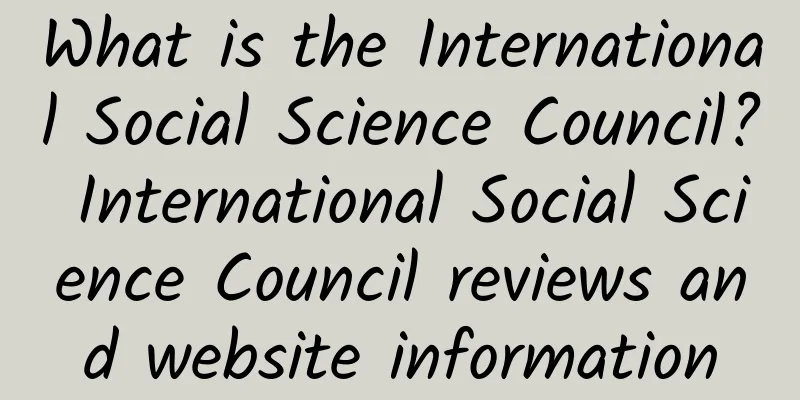What is the International Social Science Council? International Social Science Council reviews and website information

|
What is the International Social Science Council website? The International Social Science Council (ISSC) is an international non-governmental organization founded in 1952 and headquartered in Paris, France. ISSC is mainly committed to promoting social sciences and their application to major contemporary issues. Website: www.worldsocialscience.org International Social Science Council: A global promoter of social sciencesThe International Social Science Council (ISSC) is an international non-governmental organization with far-reaching influence. It was founded in 1952 and is headquartered in Paris, France. As an organization dedicated to promoting social sciences and their application to major contemporary issues, ISSC not only builds a platform for cooperation and communication for the global academic community, but also promotes the development of social sciences on a global scale through a series of research projects, policy recommendations and international cooperation. The official website www.worldsocialscience.org is an important window to understand the organization's mission, activities and achievements. The following will introduce in detail the historical background, organizational structure, core tasks of the International Social Science Council and its unique contribution to the global social science field. History: From Founding to TodayThe birth of the International Social Science Council can be traced back to 1952, shortly after World War II. At that time, the global society was undergoing profound changes, the shadow of the Cold War loomed over international relations, and the colonial independence movement was in full swing. It was in this context that a group of social scientists from all over the world realized that a platform that could transcend national boundaries was needed to promote the research and development of social sciences and apply them to solving global challenges. As a response to this need, the International Social Science Council was formally established under the auspices of the United Nations Educational, Scientific and Cultural Organization (UNESCO). Since then, the organization has been playing the role of connecting the global social science community, promoting knowledge sharing and interdisciplinary cooperation. In its long history, the International Social Science Council has undergone several transformations and expansions, gradually expanding its member network and influence. In recent years, with the acceleration of globalization and the emergence of new technologies, the International Social Science Council has also adjusted its strategic direction in line with the times. It pays more attention to addressing major issues of the 21st century such as climate change and increasing inequality, and supports exploration in related fields by funding cutting-edge research projects. Organizational structure: a diverse collaborative networkThe International Social Science Council has a highly diverse and flexible organizational structure, which enables it to effectively integrate voices and wisdom from different countries and regions. Its main components include:
This multi-level and multi-dimensional organizational form enables the International Social Science Council to respond flexibly to various complex challenges while maintaining overall consistency. Core mission: Promote the application and innovation of social sciencesThe core tasks of the International Social Science Council can be summarized as follows:
Through the above efforts, the International Social Science Council has not only enhanced the voice of social sciences in global affairs, but also made positive contributions to building a more just and sustainable world. Global impact: Shaping the future direction of social scienceAs a bridge connecting the global social science community, the International Social Science Council has made remarkable achievements in the past decades. The following are some specific manifestations of its impact on the world:
In short, the International Social Science Council has become an indispensable part of the global social science field, playing an irreplaceable role in both academic research and social practice. Looking to the future: meeting new challenges and opportunitiesDespite its many achievements, the International Social Science Council still faces many challenges. The first is how to further expand its influence in the global South, because social scientists in these regions often find it difficult to fully participate in international exchanges due to lack of funds and other reasons; the second is how to better use modern information technology to optimize internal management and external communication. In addition, as the global governance landscape changes, the International Social Science Council also needs to rethink its own positioning in order to continue to play a leading role in the multipolar era. This means that in addition to maintaining its existing advantages, it also needs to actively explore the possibility of developing new partnerships with other types of organizations (such as the private sector and civil society). In short, the International Social Science Council will continue to maintain an open and inclusive attitude, bringing together the world's best minds to jointly explore answers to common human problems. We have reason to believe that with the joint efforts of all members, this historic and vibrant organization will usher in a more brilliant future. |
<<: What is Canada Post like? Canada Post reviews and website information
>>: What is World Vision? World Vision reviews and website information
Recommend
Can pregnant women eat chestnuts? Nutritional value of chestnuts
In this chestnut season, the sugar-fried chestnut...
What is Woot like? Woot reviews and website information
What is Woot? Woot was one of the first group buyi...
What are BH Bikes like? BH Bikes reviews and website information
What is BH Bikes? BH Bikes is the largest bicycle ...
How is Japan Kenko Cosmetics? Reviews and website information of Japan Kenko Cosmetics
What is the Japanese Kenko drugstore website? Kenk...
How is Google? Google reviews and website information
What kind of website is Google? Google is currentl...
How is Vladivostok State Medical University? Vladivostok State Medical University Reviews and Website Information
What is the website of Vladivostok State Medical U...
The efficacy and function of money grass and the method of eating money grass
Moneywort is a very cute aquatic plant, and its r...
Can stewed pig's trotters with soybeans increase milk production? How to eat soybeans to increase milk production
In every family, mothers will be given extra care...
How to make rice cake and red bean soup
Rice cakes represent rising year after year, and ...
Honeysuckle porridge
How much do you remember about honeysuckle porrid...
What is Foster + Partners like? Foster + Partners reviews and website information
What is the website of Foster + Partners? Foster +...
How is the University of California? University of California reviews and website information
What is the website of University of California? T...
The efficacy and function of Trillium serrata. Steps of making Trillium serrata
Trillium has the effects of clearing away heat an...
The efficacy and preparation of Shenghua Tang
Have you ever drunk Shenghua Tang? Do you know it...
Can aloe vera be eaten? What are the taboos of eating aloe vera?
Aloe vera is a familiar green foliage plant and a...









